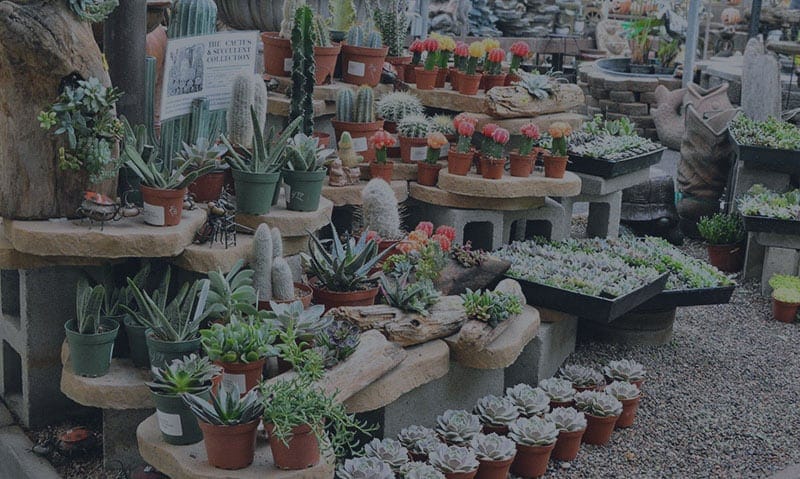Newsletter Articles
Finding Low Pollen Plants for Your Yard When You Have Allergies
Written by Kelsey W.
Allergies to pollen, grass, and other things that commonly live outside in the garden are especially common, and it’s a shame that the beautiful flowers of some plants can cause discomfort and runny noses.
If you love plants but have a hard time with sneezing and watery eyes whenever those plants have a chance to bloom or have their leaves rustled by the wind, don’t despair! There are some plants out there that should make things easier on your nose and allergies.
Also, you might assume that low-pollen plants won’t look beautiful, but quite to the contrary, some of the most beautiful plants in the world are quite friendly to allergy sufferers. Flowers that require pollinators are often some of the most beautiful because they need to attract bees and butterflies, so their pollen is spread to other plants..
Let’s learn about some of the best plants for your garden and home that will treat your nose gently when you have allergies.
Choose a Plant With Pollen That Doesn’t Fly
Pollen is a substance that some plants produce that is transported from one plant to another during the growing season, and it’s a major reason some people suffer from seasonal allergies. The stuffy nose you get in the spring when everything starts blooming isn’t necessarily from the actual flowers but from the little specks of pollen that float around on the wind.
If you’re concerned about sneezing when coming into contact with flowers, you don’t need to worry as long as you’re using roses in your arrangements. While roses do produce pollen, it’s not a type that’s carried by the wind to other plants, which means there’s no danger of rose pollen floating into your nose.
As an added bonus, roses are an excellent source of pollen for bees, who will visit your Southern California rose garden whenever the flowers are in bloom. Roses are an important and valuable flower for pollinators that are also, helpfully, hypoallergenic for allergy sufferers.
Another gorgeous plant that’s ideal for allergy sufferers is the tulip, which is an excellent plant when you’re looking for indoor arrangements or container plants inside your home. Like roses, tulips don’t have pollen that becomes airborne, so there’s no likelihood of sneezing.
As long as we’re talking about plants that tend to bloom in the early spring, you can add daffodils to your list of hypoallergenic plants. Like tulips, their pollen doesn’t like to fly, and they even tend to produce less pollen than other flowers. You can grow daffodils in your SoCal garden outside or in a container garden on your balcony, or in a bright, sunny window.
Some Plants Actually Take Allergens Away from Your Nose
Not only do some plants hold onto their pollen for pollinators rather than your nose, but some actually have the ability to take pollutants out of the air, meaning that they could help you breathe more easily in your home and around your house.
With all the freeways and traffic that we have in the Southland, it helps to create an environment full of air-purifying plants and greenery. While no plant can remove all the airborne contaminants from the air, there are some species that can clean things up a little bit when added to your home.
One excellent example is the Dracaena or Dragon Tree, which comes in several varieties and is a super tolerant plant for indoor living but fares well outdoors, too, as long as they’re not in direct sunlight absolutely all day. When you place them indoors, they don’t need a lot of attention and will just sit there beautifully, soaking up air pollutants for you.
The Dracaena is awesome for three reasons. First, the plant looks quite unique and fits in wonderfully with the Southern California aesthetic. Second, it’s a hypoallergenic plant, so it’s safe to bring it inside your home even if you have plant-related allergies. Third, it actually acts as an air filter and can trap allergens before they ever get to your nose!
Another super healthy plant to welcome into your home or garden is the peace lily, which performs in the same manner as the Dragon Tree by soaking up toxins while also holding onto its pollen, so it doesn’t float into your nose. Studies have even shown that peace lilies can remove mold spores from the air, which are another super common allergen.
A final hypoallergenic option you might want to add to your allergy-friendly plant menagerie is the Lady palm, which is considered by some to be one of the least-offending plants for allergy sufferers. The lady palm doesn’t actually produce pollen, which makes it ideal when you have a very bad reaction to pollen and want to keep it out of your home at all costs.
As a bonus, lady palms won’t harm your pets or any of the humans in your life, so they’re safe to put in your home no matter what inhabitants you share your space with. Further, their big wispy palm fronds have a nice habit of holding onto airborne contaminants for you.
Bushes for Your Front Yard
Now that you know what flowers and plants you can bring into your home in a vase or plant in the garden it’s time to explore the options you have for shrubs and bushes, should you want to plant some beautiful greenery around your house.
It’s no fun to walk outside your door and down the driveway or walkway and start sneezing because of the beautiful but pollen-filled bushes that line your home. Now, the key to a clear nose and a beautiful yard is finding bushes that serve two purposes: first, they don’t produce a lot of pollen and don’t make you sneeze.
Second, they’re thick enough to create a privacy wall between you and the airborne pollen that could float in from other places. While you can’t really create a pollen-free bubble unless you encase your entire home in plastic (somewhat unrealistic, right?), you can use those thick hedges and bushes as a barrier against pollen.
One plant to consider is the hydrangea, which is an ideal part of your beautiful garden due to its ability to flower throughout much of the year, especially in Southern California. The pollen in a hydrangea bush is sticky and doesn’t float around in the air whenever the wind blows.
When left to grow with wild abandon, they can create a big, beautiful display of flowers. Did you know that you can change the color of your flowers by changing the pH level of the soil? Acidic soil will make the blooms blue, while alkaline soil will turn the blooms pink!
Another excellent bush for your home’s yard is the ever-trusty boxwood, which is a popular green wall bush used all over Southern California. Not only does the bush provide an excellent barrier against floating pollen, but the bush is hypoallergenic since it produces very low levels of pollen.
If your allergies are particularly fierce, let someone else do the pruning on the bushes whenever they need it. The leaves can cause some irritation on the skin for anyone who has strong allergies, and the boxwood does have a pretty impressive scent when it’s been freshly cut.
Yes, Cactuses and Succulents are Hypoallergenic
You’ve probably already guessed, but cactuses and succulents are absolutely made for allergy sufferers. Not only are they ideal for the Southern California environment and grow here natively, but they’re also low-maintenance, which means you can plant them in your yard and not have to worry about braving the outdoors (and the pollen) to tend to them.
On occasion, you might find yourself allergic to the sap that some succulents produce. If you find that you’re allergic to the sap, you can usually just stick to cactuses and avoid any discomfort that touching the sap would cause.
Cactuses and succulents do occasionally bloom, especially when they’re happy and growing, but they are still considered low-pollen plants, so you shouldn’t find yourself suffering too much when one of them blooms. Just keep your distance from the bloom if you think you might have any problems with it, and it’ll fade within a few days.
Breathe Easy with Plants from Green Thumb Nursery
Don’t assume that you can’t have lovely, growing plants in your home and around your garden if you suffer from allergies. For the best advice on beautiful and hypoallergenic flowers for your house, visit your friendly SoCal Green Thumb Nursery for information, advice, and new plants to bring home.
Do you like what you see? Sign up for our weekly newsletter to get content like this every week!


